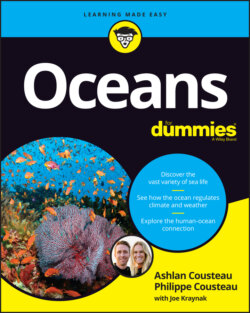Читать книгу Oceans For Dummies - Joseph Kraynak - Страница 38
Increasing our knowledge of the world around us
ОглавлениеUnfortunately, in the world of science, ocean explorers often take a back seat to astronauts. Popular movies and the media often depict marine biologists as nerdy bookworms or beach bums spending as much time working on their tans as they do researching the ocean. (Admittedly a tan can be a perk of the job) Astronauts, on the other hand, are always portrayed as brave pilots who train vigorously and risk their lives to explore “the final frontier.”
Admittedly, we’d rather be on a beach or a boat than packed like sardines into a space capsule or walking around on a dusty gray moon, but we assure you that ocean explorers are just as serious and committed to their work, and that it can be more dangerous. We can also assure you that the work of ocean explorers is just as valuable as that of space explorers, if not more so. Ask yourself if knowing whether or not water on Mars matters at all to your existence (hint: it doesn’t). Okay, okay, researching the history of water on Mars is valuable to understanding other planets and even our own to a certain extent. But knowing and protecting our ocean is critical to our very SURVIVAL on this planet.
Don’t get us wrong, we think space exploration is cool. The problem is that the U.S. government invests at least 150 times more money in exploring space than it does exploring the ocean. That would be fine if we had endless money, but we don’t. In a world with dwindling resources and a growing population struggling with climate change, maybe sending more money into space isn’t the best allocation of resources. “But wait — can’t we have both you might ask?” Sure, that would be great! But, to have both, equally, would mean that the oceans should get at least the same budget as space, and that is far from the case.
Here are just a few of the many practical benefits of ocean exploration:
As resources become scarcer, people are having to go deeper to get them. Ocean exploration leads to the discovery of new sources of food, energy, and other resources and provides a better understanding of how to safely and sustainably tap the ocean for these resources.
Increased knowledge and understanding of conditions in the deep sea better prepare humans to respond in the event of deep-sea disasters, such as sunken ships, lost submarines, and offshore oil drilling accidents.
Deep-sea exploration led to the 1977 discovery of rich ecosystems that developed around deep-sea hydrothermal vents — cracks in the ocean floor out of which percolates magma-heated water chock full of chemicals. Prior to this discovery, scientists believed only sunlight could provide the energy required to grow enough food to support large, diverse ecosystems. But here, at the bottom of the sea, where the sun doesn’t shine, microbes evolved the capacity to extract energy from chemicals through a process called chemosynthesis. This discovery completely rewrote the definition of “life” and the scientific understanding of what was required to support it. (See Chapter 5 for more about ecosystems that develop around hydrothermal vents and how it’s possible.)
Various technologies used for exploring and monitoring the ocean continuously gather data and make it available for analysis to help predict earthquakes, tsunamis, and hurricanes.
Ocean exploration collects and analyzes valuable data related to the health and abundance of different marine species, which is crucial for detecting early warning signs of declining populations and revealing possible solutions.
These are just a few of the practical benefits of ocean exploration. Many more will certainly become apparent as ocean exploration evolves. Currently, only about 5 percent of the ocean has been explored, so our understanding of the ocean is still in its infancy. In fact, we know more about the surface of our moon than we know about our ocean, and we have better maps of Mars than we do of the ocean floor. Yet, the future of ocean exploration has some very exciting prospects and much more practical applications. One more thing, for those who think astronauts are cooler than ocean explorers — guess where they do some of their most serious training … underwater. That’s right, astronauts train underwater to prepare them for space, because surviving in space is easier than surviving underwater. So who’s more badass now?
